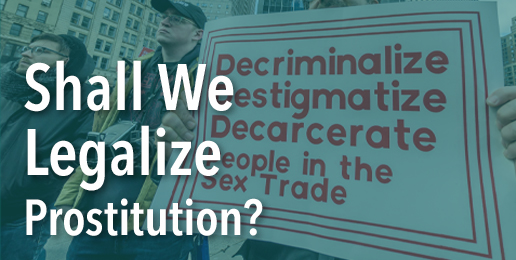
Why would Equality Illinois, a non-profit organization established to promote the civil rights of LGBTQ individuals, be involved in promoting the decriminalization of “sex work”. . . in other words, stop enforcing laws against prostitution? How does this help those who consider themselves LGBTQ?
Equality Illinois was founded in 1991 as the Illinois Federation for Human Rights. The name change occurred in 2000, the same year the organization succeeded in securing the passage of the Illinois Hate Crimes Act, which criminalized hate crimes based on sexual orientation and gender identity.
Five years later, the group helped pass an Illinois Human Rights Act amendment, which prohibited discrimination based on sexual orientation and gender identity in housing, employment, and public accommodations.
Equality Illinois was also instrumental in passing the Illinois Civil Union law in 2010. The group additionally conducted a landmark study on how civil unions conferred second-class status on couples compared to traditional marriage.
That study and the group’s campaign led to the passage of the Religious Freedom and Marriage Fairness Act, which legalized same-sex marriage in Illinois in 2013, the 16th state to adopt such a measure.
A few weeks ago, on May 8th, Equality Illinois held a press conference in part to urge the decriminalization of sex work in Illinois. Several legislators, all Democrats, participated and pledged to initiate efforts to accommodate sex workers in this state. Currently, prostitution is not legal anywhere in the country except in 10 Counties in Nevada. Even there, it is only legal in licensed brothels.
Based on the press conference, Equality Illinois has something broader in mind. It does not seem they currently want to legalize sex work; they want to decriminalize it for consenting adults.
That sounds like a distinction without a difference.
Unlike in Nevada, Equality Illinois’ plan for decriminalized sex work would not confine the activities to licensed brothels, nor would there be any licensing or regulation involved. Their position is decriminalization is necessary for the following reasons:
1.) Increase safety for sex workers—criminalized sex work makes the workers more vulnerable to violence, exploitation, and discrimination, especially workers who are LGBT. According to Equality Illinois, 75% of sex workers are victims of assault.
2.) Reduce barriers to accessing services—decriminalizing sex work gives the workers better access to housing and healthcare. Education also is more accessible, as is employment.
3.) Improves public health and reduces harm—decriminalization can lower HIV and STI rates since sex workers are better able to demand safe practices such as condom use.
4.) Provides bodily autonomy and reduces stigma—sex workers are stigmatized by criminal laws prohibiting their activities. As a result, they face discrimination and marginalization. LGBT sex workers are especially stigmatized. As a matter of principle, sex work should be decriminalized because all people have a right to make their own choices regarding their bodies.
Most of these claims are debatable or don’t tell the whole story. Sex work indeed exposes workers to violence and exploitation. I can’t address the claim of increased discrimination because I don’t know what they are talking about. If they mean that when club owners don’t allow prostitutes to hang out at the bar, it’s discrimination, that’s probably right.
They don’t. Decriminalizing sex work will not change that.
I know, from my years in the law enforcement field, that violence and exploitation go hand in glove with prostitution. That won’t change if it’s decriminalized. If it’s legalized and confined to brothels as in Nevada, violence and exploitation will be reduced . . . in the brothels. But those who continue to sell themselves wherever they want, on the open market like Equality Illinois wants, will continue to be victimized.
It would be interesting to hear the explanation for how decriminalizing sex work will improve the workers with better access to housing, healthcare, and employment. Maybe they think it would limit landlords, employers, and healthcare services from discriminating against sex workers.
They might be right on this point.
Several years ago, in a case against middle school teacher Stacie Halas, the school district fired her after a student discovered she had previously performed in pornographic films. She sued the district, arguing her firing violated her constitutional rights. She lost in that case, but the loss ultimately seems to have been more related to her lying in her employment application.
(I am not sure which is more disturbing here, that a middle school teacher was a porn star or that a middle school student found her out.)
A case I recently investigated involved a teacher in Chicago who ran a BDSM sex club out of his home. He was found to have had an improper relationship with a student, but his sex club involvement was considered irrelevant by the Chicago Public School’s Office of Inspector General.
What is clear from these cases is that if sex work is decriminalized or legalized in Illinois, landlords and employers—including public schools—will be limited in their ability to exclude them. It also will be challenging to restrict healthcare coverage based on selling your body.
The third claim by Equality Illinois is preposterous. Decriminalizing sex work will not reduce HIV or STI rates. The idea that criminalizing sex work makes it more difficult for workers to demand the use of condoms has no support in the literature or common sense.
Consensual casual sex is legal, yet the legality seems to have had no impact on the prevalence of STIs. Syphilis, for example, was in decline for many years until 2003, when it began to rise again, especially among men. Gonorrhea numbers declined steadily from 1985 to 1997 and then flattened out until now. Chlamydia, on the other hand, has been on a steady rise from 1985 to the present.
Perhaps sex workers who operate in brothels might experience safer sex because of increased controls and supervision, but in general, I don’t see any support for that claim.
I can’t quarrel with the “my body, my choice” argument. However, when the choices someone makes regarding their body begin to infringe on the rights of others, the range of options is subject to restriction. As for being stigmatized because sex work is criminal, that’s not the whole story on that. If it’s made legal, it is unlikely that they will be invited to join the local Chamber of Commerce.
Good grief, people are stigmatized, even canceled, because of the person they voted for in the last election.
Issues around decriminalizing or legalizing prostitution and sex work are complicated. Any law that might be adopted will profoundly impact our entire culture. Here are just a few of the issues that must be explored and addressed in any such legislation:
Legal/Regulatory:
- Specific legal model (full legalization, decriminalization, etc.)
- Regulations around licensing, zoning for brothels
- Protocols to screen for trafficking/coercion
- Sex worker rights and protections under the law
- Age limits and penalties for underage prostitution
- Impact on law enforcement’s ability to police sex crimes
Public Health:
- Mandatory testing/health checks for sex workers
- Preventing the spread of STIs
- Mental health services for sex workers
- Rape kit protocols and treatment access
Public Safety:
- Potential effects on violence, exploitation, pimping
- Measures against human trafficking networks
- Impacts on areas surrounding legal brothels
- Trafficking sanctions and enforcement strategies
Economic:
- Tax revenue implications
- Labor laws and benefits for legal sex workers
- Economic effects on illegal prostitution markets
- Costs of monitoring and regulating the industry
Social/Moral:
- Feminist debates around gender equity
- Views about making sex a commodity
- Effects on marriage/family structure
- Potential demand increase or decrease
- Societal normalization of prostitution
International:
- Relation to anti-trafficking laws/treaties
- Immigration policies for legal sex workers
- Cross-border trafficking implications
- Practices in other legalized regions
Every one of these elements, and many more, requires intense examination before there are any changes in the laws regarding sex work. Decriminalization would be an experiment mainly based on speculation that will profoundly affect real people.
Amnesty International is the loudest voice on legalizing sex work and has issued a policy on it. It continually uses part of its annual $500 million budget to promote global legalization. The organization also has issued several reports on the subject, which are far more in-depth than any organization in Illinois has produced.
It appears that Equality Illinois has bought into this international effort to decriminalize sex work. Based on its past successes, they are likely to succeed. Amnesty International’s policy specifically addresses LGBT groups with arguments like those of Equality Illinois:
Human rights violations against sex workers are due not solely to criminalization of sex work, but also to stigmatization, gender-based violence and discrimination, among other things. . . Direct and indirect discrimination against sex workers and/or on the basis of gender, sexual orientation, gender identity, race, caste, ethnicity, Indigenous identity, migrant or other status, intersect to deny affected groups resources, opportunities, security and power necessary for the full enjoyment of human rights. Groups most affected by discrimination and inequality are frequently over-represented in sex work.
The effort to decriminalize sex work is part of the broader global attack on marriage and the family. Decriminalization and legalization of sex work erode the relationship bonds between men and women, devalue the procreative and relationship-strengthening purpose of marriage, and threaten existing marriage relationships.
Pornography does the same thing.
It’s doubtful that the Illinois General Assembly will take seriously its responsibility to evaluate this issue, as well as all the other complex issues, and make a decision based on what’s best for the people of Illinois. As usual, they will likely decide based on which side gives them the most campaign contributions.
Likewise, we can’t expect our churches to take up the cause and engage with the decision-makers on this topic. It’s too unseemly, too political, and might lead to conflict.
It’s up to all of us. We get the elected officials we deserve. If you want change, change the people in office. Find honorable candidates, support them, and vote them into office. As for the church, find a Bible-believing church that engages with the culture. The church is supposed to drive the culture, not conform to it.
The more churches start carrying out their purpose, the more we all benefit.






















